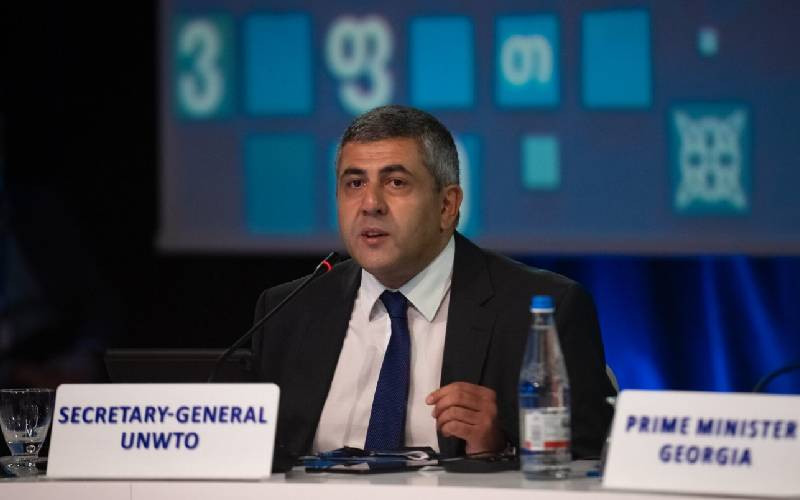By John Oywa
Sudanese President Omar al-Bashir, whose visit to Kenya on Friday has kicked an international backlash, is a battle-hardened former paratrooper who loves controversy.
Although he discarded his military fatigues to become a civilian president after winning Sudan
He must have been ready for combat with the International Criminal Court (ICC) agents when he slipped into Kenya under tight security on Friday to attend the promulgation of the new Constitution. |
Sudanese President Omar al-Bashir; Photo: File/Standard |
Faced with a warrant of arrest from ICC over alleged genocide crimes against humanity in his country
But Bashir the soldier, clad in a dark blue suit and armed with a shiny black bakora (walking stick) strolled into Uhuru Park a free man, exchanged pleasantries with President Kibaki and other dignitaries before sneaking back to Khartoum a few hours later.
Kenya
But who is this man Bashir?
The tall bespectacled Suni-Muslim is a career soldier who powered his way to power in a blood less coup against Sadiq-Al Mahdy on June 30, 1989, and went on to tighten his grip on the expansive country.
Bashir was born in January 1944 in a tiny village of Hosh Bannaga, in the northern frontiers of capital Khartoum. His tribe He received his primary education there, and his family later moved to Khartoum where he completed his secondary education.
He studied at the Egyptian Military Academy and also trained at the Sudanese Military School in 1966, six years after joining the military. A shrewd soldier and sharpshooter, Bashir quickly rose through the ranks and became a paratrooper and later a colonel.
On June 30, 1989, he led a platoon of soldiers in toppling the coalition government of Prime Minister Sadiq Al-Madi in a bloodless coup that ushered in military rule in Africa
He quickly consolidated power by making himself the chairman of the newly formed Revolutionary Command Council for National Salvation.
Besides the Presidency, he doubled as the Chief of the Armed Forces and the Minister for Defence.
Bashir later suspended political parties and introduced Sharia law in the northern part of Sudan. His Government clamped down on free and independent media.
In 1993, he disbanded the Revolutionary Command Council for National Salvation and all other rival political parties.He was later elected president in 1996 in a one-candidate man election. His political party
In 1993, the United States listed Sudan as a State sponsor of terrorism and even bombed a pharmaceutical company in Khartoum suspected to be manufacturing chemical weapons.Bashir won again in 2000 and appointed former National Assembly speaker, Hassan al-Turabi as the National Congress Party chairman. He however fell out with Turabi when he introduced a Bill seeking to clip the Presidential powers. Angry at the attempts to dilute his powers, Bashir dissolved Parliament and suspended Turabi from the party.
He ordered Turabi imprisoned over an alleged plot to overthrow his Government.
Under Bashir, Sudan has suffered civil wars pitting Bashir
Kenya and the international community intervened and a comprehensive peace agreement was signed between Bashir and the Southern Sudanese People
But it was the conflict in the Western Province of Darfur that has earned Bashir a date with the ICC.
Bashir is accused of fueling the Darfur conflict that started in 2003 and is said to have killed more than 200,000 people and displaced more than two million others.
The ICC wants Bashir charged with genocide and a warrant against him has been issued.
Bashir last month skipped an African Union Heads of States meeting in Kampala after word leaked that President Yoweri Museveni
By inviting him into the country, Kenya has stirred a hornet
 The Standard Group Plc is a multi-media organization with investments in media
platforms spanning newspaper print operations, television, radio broadcasting,
digital and online services. The Standard Group is recognized as a leading
multi-media house in Kenya with a key influence in matters of national and
international interest.
The Standard Group Plc is a multi-media organization with investments in media
platforms spanning newspaper print operations, television, radio broadcasting,
digital and online services. The Standard Group is recognized as a leading
multi-media house in Kenya with a key influence in matters of national and
international interest.
 The Standard Group Plc is a multi-media organization with investments in media
platforms spanning newspaper print operations, television, radio broadcasting,
digital and online services. The Standard Group is recognized as a leading
multi-media house in Kenya with a key influence in matters of national and
international interest.
The Standard Group Plc is a multi-media organization with investments in media
platforms spanning newspaper print operations, television, radio broadcasting,
digital and online services. The Standard Group is recognized as a leading
multi-media house in Kenya with a key influence in matters of national and
international interest.










